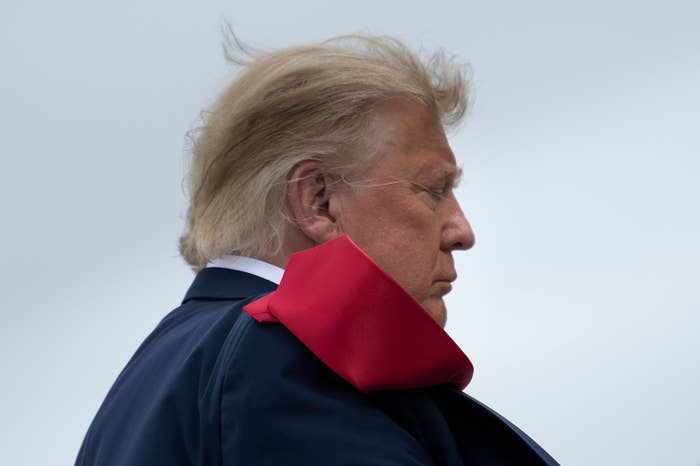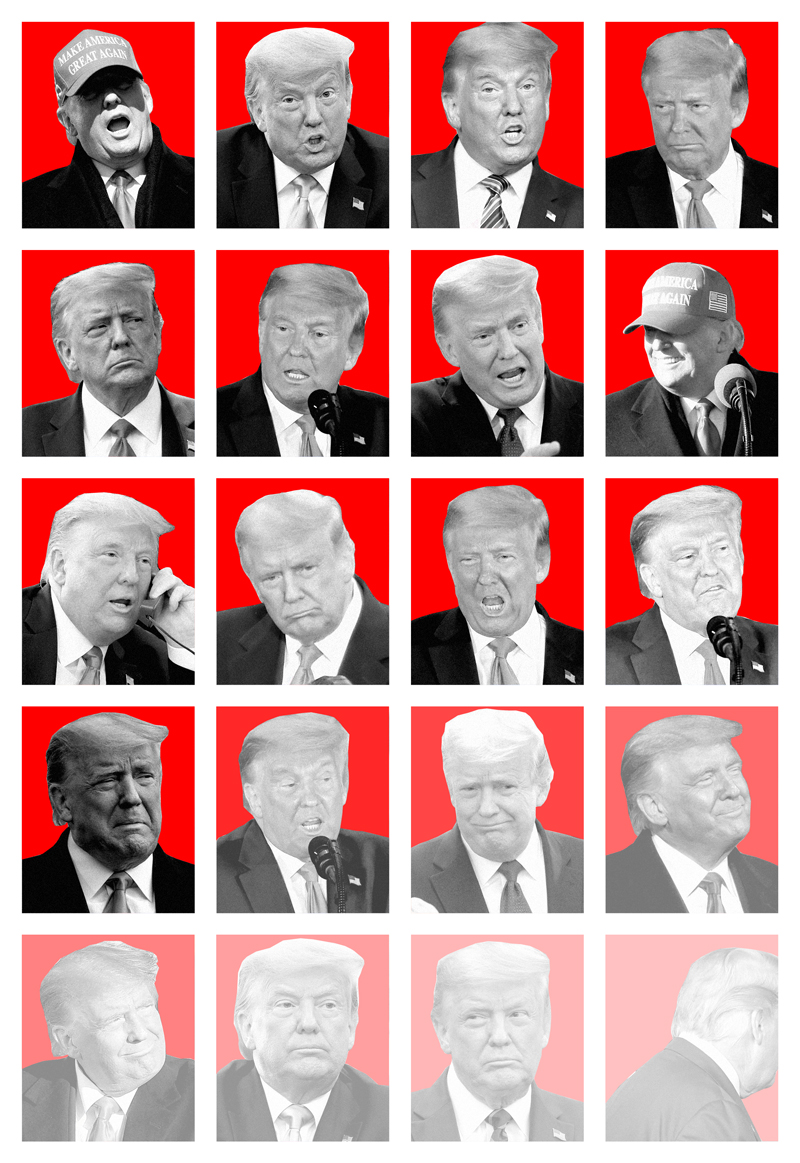Someday, someday sooner rather than later, we will be removed from Donald Trump’s subconscious and returned to our own devices. That’s the idea. That’s the hint of separation since Joe Biden was declared winner on Saturday.
For the last five years, each morning’s begun with — it can’t really begin without — whatever Trump wakes up thinking. At first, when he became president, that seemed to throw the country into shock — that it would really be like this. He would still watch TV all day and attack otherwise unknown citizens from time to time. Trump, at once immutable and ever-shocking, would not transform into A President. Starting the day off with a bullet: ENJOY!
Years from now, this might be difficult to explain: the way entire days got yoked to one person’s rants, reactions, cruelties, refusals, jokes, tangents, and to just thinking so often about the president. Even weirder, and more difficult, would be explaining how an entire country became accustomed to living inside one person's head.
Still, you think Trump can't shock you again at this late date, and then in the early morning hours, he’s telling you, exclamation point included, that he’s tested positive for a virus that’s now killed more than 237,000 people in the United States. Between then and his exit from the hospital, for a few days, his ceaseless VOICE was absent — no tweets, no rallies, no calls to Hannity. Yes, there were a few tweets from his account, but they lacked that je nais se quoi special sauce we all know so well by now of Trump’s actual voice. To fill the void, news of all the surreal events of the preceding week broke out: that donors somehow did karaoke in Minnesota and ate from a literal buffet in New Jersey; that Trump met with Gold Star families indoors; that nobody could say when the president was last tested for the virus nor could they pin down exactly when he had contracted it; that the virus seemed to just be coursing through the White House, and names you know kept testing positive like they were in a Michael Crichton novel; that people did not disclose to those they’d seen that they had contracted the virus. On and on until, finally, Trump could reemerge from the hospital, walk up the steps to the White House, and respond to a woman's tweet that she “would wade [through] a sea of COVID infested water to vote for President Trump on November 3rd,” by appending:
“Thank you Heather!”
Trump rose alongside a massive shift in the way we communicate: Apple only introduced the iPhone 13 years ago, and most of the interfaces through which we experience news did not mature until the 2010s. People take photos and write to each other all day now.
Twitter, Facebook, and Instagram emphasize reaction; each serves up the thoughts of another person and asks you to reply, like, reshare, add a comment. On Twitter, when clicked, the heart icon explodes. But you can extend that dynamic across all kinds of platforms, from the iterations of and modifications to a simple joke format on TikTok to suburban wars about what's really happening on Nextdoor. Near-universal iPhone and Android usage means even when you are alone or in an unfamiliar place or among strangers, you can be with the people you know on some level; sitting in an airport or waiting in line at the grocery store changed forever in this way. This shift, especially with the platforms, creates a dual dynamic where you're both reacting yourself and consuming the reactions of millions, sometimes concurrently.
Into the chaotic jolt of the last decade to our lives, Trump entered (or reentered) in 2015. He disregards what you're allowed to say in public and will continue down his chosen line with the exoskeleton of his own emotions exposed — until he changes direction. With Trump, as the New Yorker’s Ben Wallace-Wells recently put it, past and future get pushed aside and “all that is left is an overwhelming present.”
Nobody may ever command anyone’s attentions ever again like this. Even when the next president was about to speak on Saturday night, the current president was still a frequent subject on television; the only constant we’ve had is this electric dynamic with Trump at the center, pushing into everyone's brains. You can see how reacting to Trump has dominated in ways good, bad, superficial, nightmarish, and everything in between — reshaping everything from the gender makeup of the political parties to conservatives’ view of trade to, possibly, the public’s view of schools reopening during the pandemic. There’s an entire meta layer of politics too, built around reaction as object: the right-wing, scoreboard-bitches politics of :fire: savage owns versus blue-wave resistance superficiality that adopts unusual figures as righteous versus a cancel culture obsession that emphasizes online conversation as the story over most else.
Inside this objectively confusing and chaotic period, some people reasonably view the prevailing lesson, or at least the ethos, of the last decade as: Nothing matters. The idea is a breezy nihilism, or at least an ironic nihilism to mask a bruised-heartedness. Institutions couldn’t stop Trump during the 2016 Republican primary, TV networks continued airing his rallies and accepting his live calls even when people were begging them to stop, Republican campaigns wouldn’t attack him because they kept waiting for Trump to break open on his own accord, with his supporters falling their way. Trump would continue to be Trump, unimpeded, amassing more power.

Except hasn’t this year reasserted that everything’s mattered, all along?
2020 has been at the intersection of perception, reaction, and the overwhelming present — and the dense, inelastic reality of how things are offline.
There’s give-and-take between those two states; they each affect the other. But this year has been an enormous corrective to the balance.
An airborne pandemic can't be contained, exactly, by reaction and perception. This starts with Trump but extends outward: The absence of unsafe behavior in your Instagram stories will not negate actual unsafe behavior out of frame. The absence of a test will not negate the fact that you have the virus. The coronavirus causes, in some, serious heart and lung problems, deep fatigue, and mental fog. Sometimes people are totally fine; others never wake up. There's no trick to undo catching COVID-19, which will be indifferent to whether you performed the false appearance of precaution or acted like you punched the virus in the face at Yalta.
Institutions shape and conform to the real decisions people make at the top; eventually, Trump worked his way to the center of all the biggest institutions directly or indirectly, unimpeded by everyone’s expectations — and even if they are eventually undone, his decisions on, for instance, immigration and the pandemic will endure. And though invisible, the pandemic reasserts the literal in the most minute ways — that actually, if you tell people that a certain precaution is real or fake, they’ll mostly listen and act accordingly. Individual must work in concert with individual for the mutual benefit.
But you can see the cumulative effect of the last five years — the way that each word matters — in all kinds of places. The cumulative effect of 10 years’ worth of terrible videos and stories of people using force on Black people has been to materially change the public's mind about the need to change policing. The big reveal is that Instagram activism will not diminish offline mistreatment of nonwhite employees, or sexual harassment and assault, and that though the longtail of the online may change the way people think, people will see the dissonance between the online and the real. The affirmation of this isolated year is that we know video and text do not perfectly stand in for interaction between person and person in real life.
Then, finally, there are the election results, which carry on irrespective of claims and anxieties. The story, so far, was very quiet: millions following the directions to vote, and waiting in patience for the results.
Lately, I’ve been thinking about how, actually, everything matters down to the very last — that the individual isn’t a constant, either. There’s a song by Mitski, “Two Slow Dancers,” which centers on the last couple out on the floor who is no longer so young. The song features a swelling refrain against a drone: “to think that we could stay the same.”
The thing with Trump as president has been that you can’t live like this all the time. You can't always be alive to the surreal excesses of a “Thank you Heather!” era, and you must accept that the president talking about how he’s glad North Korea's dictator is doing well again is something that just happens. Because, what else could you do? You'd be unable to do anything but watch the president and respond. This seems to be true, even, for casual Trump supporters who often say that they just ignore what he says, as if Trump could abide us not thinking about what he says. I imagine that nearly everyone has had a handful of moments, fewer and farther between as time goes on, where you look up on the sidewalk or in the freezer aisle and think, Donald Trump is...president, wow.
But sometimes that moment takes on a different color — an almost out-of-body, rewinding-back feeling; the ice and stone that accumulates around hearts falls away, and you're able to see your surroundings in vivid, destabilizing clarity — that everything matters, actually, and Trump’s every word mattered, that whatever's happened between all the rest of us has mattered these last five years, and when you start thinking again like that, it’s this overwhelming crack-your-heart-open experience.
So yes, the light will go off in the still-electric room. No matter how you felt about it, no matter which parts broke your consciousness and which slipped by, eventually the days will no longer begin and end and stretch to the very last with Donald Trump’s thoughts. But to think that we could stay the same! ●


